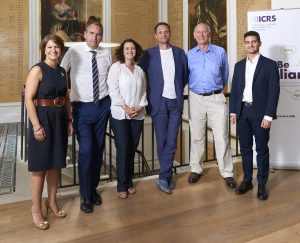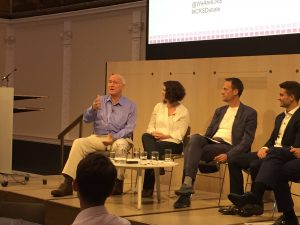On 15th September 2016 Tom was a platform participant at the first major debate sponsored by ICRS (Institute of Corporate Responsibility and Sustainability), hosted by the RSA and chaired by the RSA’s director Matthew Taylor, in the presence of over 100 CRS/CSR professionals.

The debate was on the future of the CRS profession; at present the vast majority of people who work in CRS and CSR are graduates based in London and the South East. In Tom’s comments he pointed out that (at 62 years old) he was one of only 6 per cent of his generation to go to University whereas today the goal is for half of all 30-year olds to have a university standard (NVQ4) education. The panel agreed that there was a need for more apprenticeships and non-graduate opportunities, too.
Below are the thoughts that Tom put together when considering his remarks.
In an age of austerity, society and business have to engage better together. Why? As statutory government services are cut and charity incomes flatline a gap in community capacity has emerged, threatening the way we help the most vulnerable people, promote good health, celebrate cultures and support community cohesion. Businesses that take a broader view of how to protect the interests of their employees reap the benefits: greater employee engagement, more opportunities for innovation and partnership working and genuinely earned reputational gains are on offer.
At the same time a switch in business from shorter term to longer term thinking and planning can, for example, turn environmental challenges into opportunities. This then, is the business case: there is growing evidence that the Company Citizen is better placed to achieve sustainability in the triple bottom line – yes, including profit – than is the more predatory model so often but unhelpfully defined as the archetypal business.
 If an engagement programme can include using the surplus skills of business to, say, increase the capacity of the voluntary sector, better equipping them for survival and growth under their own terms, then a double whammy is achieved. No more will senior corporate executives have to admit that they have ‘no idea’ what life is like for people living within a mile of their plush HQ.
If an engagement programme can include using the surplus skills of business to, say, increase the capacity of the voluntary sector, better equipping them for survival and growth under their own terms, then a double whammy is achieved. No more will senior corporate executives have to admit that they have ‘no idea’ what life is like for people living within a mile of their plush HQ.
To deliver these goals and values, especially around employee engagement, a company needs a mission, a values-led philosophy, a sense of purpose broader than filling spreadsheets or making widgets. The spark to ignite this may come from Corporate Responsibility professionals, often found in the Human Resources department, a growing band of natural partnership workers, capacity builders and outward lookers. Promoting graduate qualifications is, of course, welcome; but it isn’t the only way forward.
Every manager should be a corporate responsibility worker, every company decision subjected to social impact assessment, every worker a champion for their community, fostered by the family of the Company Citizen. No more will ‘green teams’ of dedicated employee volunteers, encouraged by managers to use their voice for the environment, conclude ‘But we’re changing nothing’. We should boast not of hours volunteered but of change made.
Something is missing here. 99 per cent of businesses and half of private sector employees are excluded from this scenario: the SME sector. Whilst we define SMEs as having fewer than 250 employees in truth the median is in the 6-10 category. They have no HR departments and as for Corporate Responsibility their response is often ‘We’re not Corporates, this isn’t for us’. Yet they’re the closest to those voluntary services on the ground, the lifeblood of the community in which Company Citizens live.
By bringing SMEs together in local networks to share resources, perhaps alongside their larger cousins, capacity issues can be addressed and meaningful engagement generated to the advantage of all: society, employees and companies themselves. It can be done; the barrier to it happening is the wrong sort of thinking, hiding the path to win:win opportunities.